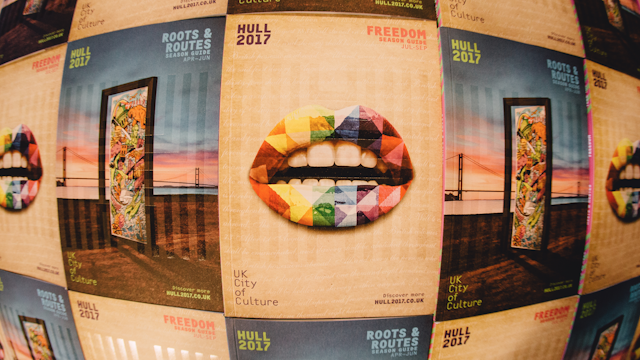How do you advertise Hull as the UK’s first City of Culture? Put a 27-year-old in charge of marketing
Phil Batty, the man in charge of marketing the city of Hull in its tenure as UK City of Culture, is just 27. He began working on the campaign in its bidding stages back in 2013, and by 2015 was touted by the Hull Daily Mail as ‘the young entrepreneur’ making sure everyone in the city had “the chance to be part of the 2017 story” in his original role of director of education, skills and legacy.
Phil Batty, now the director of marketing, communities and legacy for Hull UK City of Culture 2017, explained his job began to change in line with how his campaign – and also his brand – evolved.
“I was looking after learning and volunteering programmes, but that morphed into broader remit of marketing, digital and the overall community engagement side of Hull 2017,” he said. “We realised that our biggest and most powerful marketing tool was going to be word of mouth.”

Batty is clearly unfazed by his apparent age/job title paradox.
“William Wilberforce … who was an MP for Hull, and a really young MP… one of the things he said was: ‘We’re too young to realise that certain things are impossible so we do them anyway’,” he said. “I think it’s that sense that nothing’s impossible – this next generation of marketers are not worrying is it content.
“They’re not thinking: ‘Is it marketing?’ ‘Is it print?’ ‘Is it PR?’ They’re just trying to think what audiences will respond to and react to. And budgets being the way they are, there’s a need to experiment with different techniques and different ways of reaching audiences.”
Batty’s under-30 credentials do not automatically place him in the category of Shithot Digital Devotee. In his line of work he has a genuine belief in the power of the traditional, never shunning the power of print in favour of a Snapchat geotagging campaign.
“For us, one of our biggest investments is in our volunteering programme,” he said. “That kind of collective force of 4,000 people, who can go out and talk about your projects, can do just as much power as a great digital campaign.
“We live in a world where people access information, content and events in so many different ways, so yet digital is hugely important but traditional print and hyperlocal marketing through community networks is just as important on a project like this.”
Northern voices
From the beginning Batty and his team were under no illusions that people come to Hull for a two-week holiday. Instead, they positioned it as a place to visit to as part of a wider trip to Yorkshire, or as a destination to check out on a whim.
“One of the things we’re aware of with a cultural economy like Hull is that day tripper market, that opportunistic ‘I’m going to pop to Hull for the day’ idea, which is why we’ve made our tone of voice youthful, playful and friendly,” explained Batty. “’Everyone back to ours’ is our overarching message and call to action.”

This creative, based on a notion of flexibility and impulse, also syncs nicely with Batty himself, who at 27 is open to these liberties: “Being someone who is at that point in my own live gives that me that sense of creative freedom. It’s less about the corporate, and actually about how we tell the story of the city and use its people to do that.”
In fact the nature of Hull’s people were also front of mind when devising the stylistic tone of Hull UK City of Culture 2017. The lines ‘Everyone back to ours’ and ‘You can sleep when its over’ capture what Batty describes as the “very straight-talking, welcoming, warm and friendly” Hullensian community – not just to depict that to outsiders but to connect the entire city with the arts and culture filling the city this year. The marketing team looked specifically to the north for its agency roster too, bringing on board the likes of Jaywing Sheffield, Manchester’s Magnetic North and the home-grown Bluestorm.
Monitoring the legacy
Unlike most brands, Hull UK City of Culture 2017 has a finite span of existence and will technically be cast off its post in 2018. But this isn’t a year-long side project: numerous things are at stake, including the pressure of being the inaugural city to hold the Department of Culture, Media and Sport’s title (“We want people to look back on us and see Hull as the blueprint,” said Batty); a small backlash from certain residents to pacify; and – in a throwback to the days of London 2012 – a legacy to install.

The latter point has been front of mind for the managing team since the beginning. On a perceptible, practical level, Batty has been sourcing and creating original marketing material throughout – concentrating on capturing the year through photography and film so that “there’s loads of high-quality raw material that can be used as city marketing for the next decade”.
“Equally the next UK city culture isn’t until 2021,” he added. “So we also have those years of 2018, 2019 and 2020 [to take ownership of] and even though it’s not a 365 day programme, there’s still this rich cultural programme that happens annually in the city that we can continue to market and promote.”
On the less tangible matter of perception – how this scheme will forever turn Hull into a destination of arts and culture in people’s minds – Batty has a marketer’s dream of a campaign monitoring system. As its academic partner, the University of Hull is there to supply a rigorously detailed and robust evaluation programme, quickly digesting YouGov and citywide surveys on awareness and producing workable marketing data in real time.
So, “as well as a general sense that awareness has increased for Hull massively, we are aware at the same time that the perception has become more and more positive,” said Batty.

“We’re tracking all of that on a regular basis so we have that insight and learning that we can use in the future, and we’ve always had a really close eye on repeat visitors. It’s incredible to have so much data and learnings to shape campaigns in a live way.”
Batty and his team are still only a quarter of the way through the year they’ve been planning for since 2013, and judging by the late night emails The Drum received when researching this story, it’s a cause that’s worth the slog to change the reputation of their hometown. But why does Batty think it had a bad one in the first place?
“I don’t think Hull had a bad reputation,” he retorted. “I think Hull either had no reputation or people had a few memories or knowledge of the city that wasn’t particularly positive. So I think one of the strengths of Hull being the UK City of Culture is it’s not about writing a new story, but telling all the stories that were already there in a different way.”
He added: “I mean how often do you get the opportunity to work on a project in your hometown that is also an event that is so huge? It’s been incredible.”

